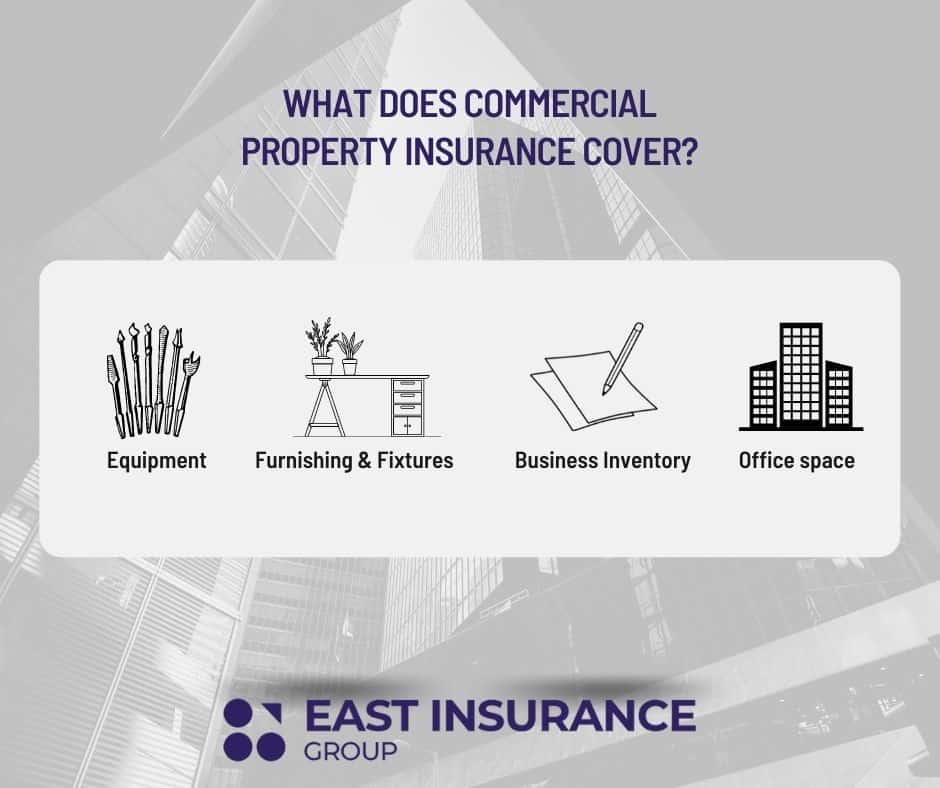
Commercial Property Insurance: The Ultimate Guide
If you are a business owner, you need to protect your assets from damages and losses at all times. Commercial property insurance is essential for all business owners, whether you’re a major incorporation or a small bakery.
Here’s everything you need to know about insurance for commercial property owners.
What is a Commercial Property Insurance Policy?
The importance of protecting your business assets by getting comprehensive commercial property insurance cannot be overstated. A commercial property insurance policy covers your business assets from fire, storms, theft, and vandalism.
Commercial property insurance covers all the physical property that is part of your business. This includes the actual office space along with the furniture and fixtures, extending as far as your fence, landscaping, and signage. It also includes all inventory, supplies, equipment, and paraphernalia that are required for the business to run.
Read more: Commercial Property Insurance in New Jersey

Commercial Property Insurance Coverage
All tangible possessions that are listed as belonging to your office space are covered by commercial property insurance.
Damages can be claimed in the event of a relatively minor event like a storm causing a tree to fall over your signboard, to a neighborhood fire destroying your office.
Damages caused due to natural disasters like hailstorms, blizzards, or heavy rains can also be considered for insurance claims.
Commercial property insurance covers:
- Equipment: computers, special machinery, tools
- Furnishing and fixtures: desks, chairs, appliances, supplies
- Business inventory
- Physical office space
Insurance companies typically offer three kinds of coverage for commercial properties. These are:
- Basic Form Policy: This type covers the most commonly occurring perils – fire, theft, and standard natural disasters – as would be clearly named in the policy document. It serves the insurance needs of most businesses.
- Broad Form Policy: In addition to the coverage offered by the basic form policy, the broad form policy also protects your property against damages by falling objects, heavy snow or ice (or severely damaging precipitation in general) as well as collapsing structures. Given its nature, it is well-suited for businesses in hilly areas that are prone to damage by snowing in, landslides and avalanches.
- Special Form Policy: It has a more comprehensive spectrum of perils, and covers everything except what the policy explicitly mentions. Therefore, the special form policy will protect your assets against everything except an ordinance of the law, earthquakes, floods, war, nuclear hazards, intentional acts, and any other perils that the policy specifically lays down.
It is imperative that the client carefully goes through the list of inclusions and exclusions while purchasing a commercial insurance policy, to get a clear idea of what they are paying for and what they still might be vulnerable to.
Read more: Commerical Property Insurance in Texas
What Commercial Property Insurance Doesn’t Cover
There are some exclusions to commercial building insurance, including property damages caused by natural disasters, such as:
- Earthquakes
- Hurricanes
- Tornadoes
- Floods
Who Needs Commercial Property Insurance?
Commercial property insurance is a must-have for anybody who owns or rents an office space or a building for business purposes. The space would include not only the front office but also the storage area or the warehouse.
You should also get commercial property insurance to protect against the loss of any equipment you might be employing to run your business – heavy machinery, computers, and associated electronics.
In fact, you are also responsible for damages to the property of any other party, which might be on the premises at the time of the peril.
For instance, a client might be carrying samples or prototypes for presenting in your office. If a fire damages these items while they are on your company premises, the owners can stake a claim in your property insurance to meet their losses.
If you live in state New Jersey, check the Commercial Property Insurance NJ.
Commercial Property Coinsurance
Businesses operating out of leased spaces might need to buy insurance only for their equipment and not the physical space (which is taken care of by the landlord).
Alternatively, there might be a coinsurance clause in the lease agreement. The clause specifies a coinsurance percentage, that is, the percentage of the value of the building that you, as the tenant, need to provide property insurance for in the event of a loss.
For instance, if the coinsurance percentage is 40% for a building valued at $100,000, then you would have to arrange for a coverage of at least $40,000 in insurance. Otherwise, the owner could charge a penalty to cover losses. You should have these terms confirmed while signing the lease agreement.
Read more: Commercial General Liability Guide
Do I Need Commercial Property Insurance?
Commercial property insurance is pretty much for every business establishment that anticipates the minutest of risks to its assets. Given that some of the most expensive damages are caused by the most commonplace of perils, one can never be secure enough.
Small business owners need to pay special attention to their insurance needs, as complacency about the safety of their property can lead them to incur heavy losses, and even closure of business, if the losses are not covered.
How Much Does Commercial Property Insurance Cost?
Commercial property insurance costs between $500 and $3,000 per year. The cost for commercial property insurance differs depending on:
- The size of the business
- The breadth of the coverage
- The commonly occurring and infrequent risks the business might be subject to
- Existing protective measures
In recent years, the vagaries of climate and accompanying disasters have seen a rise in insurance rates. Crime rates in the area where your business is located could have a direct relationship with the cost of insurance for your business, while safety precautions such as sprinklers and smoke detectors could bring down the rates.
Actual Cash Value (ACV) Versus Replacement Cost (RC)
Premiums are also different based on what method your company offers to calculate losses when claims are made.
If you choose to determine losses based on actual cash value (ACV), your premium will be lower because the method involves the replacement of damaged goods with similar items, adjusted for depreciation.
On the other hand, electing to calculate using replacement cost (RC) means that the replaced equipment will be of comparable quality to the original, without accounting for the depreciation in value. RC would basically ensure practically new, identical replacements for your lost goods, and the premium for this variant would be higher.
The coverage designed for your business would, therefore, take into account numerous factors before an accurate quote is provided.
Commercial Property Insurance Discounts
Although a prudent investment, commercial property insurance can be a major cost, especially for small businesses. To lessen the strain of the heavy premium, businesses could avail of discounts or rate reductions that come with minimizing risk exposure.
This can be done by putting safety equipment in place to counter perils like fire, for example, construction using fire-retardant materials. Burglar alarms, shatterproof glass, and surveillance mechanisms could be installed, bringing down the risk of theft.
Purchasing a Business Owner’s Policy (BOP) from an insurance company also offers you significant cost savings, as property insurance and general liability insurance are bundled together in this product. You thus pay less than you might for both these insurance packages separately, provided your business is eligible.
Commercial Property Insurance Requirements
If you own or rent an office, you will probably need commercial property insurance because landlords often require this policy from their business tenants. However, even if it’s not officially required, investing in business building insurance is always a good idea as it covers your business asses and protects you from bigger financial losses.
What is the Difference Between General Liability and Commercial Property Insurance?
General liability insurance covers your business from claims that result from bodily injuries or property damages. On the other hand, commercial property insurance covers your business location and equipment, whether you own or lease it.
Is Commercial Insurance the Same as Property?
Yes, these two policies are the same and the terms can be used interchangeably.
Can You Have 2 Commercial Insurances?
Yes, you can have two commercial policies to cover your business assets and employees.
Who Pays Building Insurance for Commercial Property?
The property owner (the landlord or an owner-occupier) usually arranges the insurance policy. In the case of a rented property, the landlord can pass off the premiums to the tenant to pay as a part of the rental contract.
What Is Evidence of Commercial Property Insurance?
The standard form used to detail the evidence of commercial property insurance is the Accord 28 and 27 forms. It’s called evidence of coverage and not a certificate because the evidence is provided to someone with a direct interest in the property that is being insured.
What Is the Standard Deductible in a Commercial Property Insurance Policy?
Usually, commercial property insurance policies include a flat or straight deductible. A flat deductible is defined as a specified dollar amount that applies to each loss. This amount is subtracted from the amount of a covered loss and the amount remaining is paid by the insurer.
Are you still confused about commercial property insurance, or do you need some help getting a quote for your business? Contact us today and get all the information you need fast and for free!
Properties We Cover

Client’s Review
- EIG Adminhttps://eastinsurancegroup.com/author/admin-2/
- EIG Adminhttps://eastinsurancegroup.com/author/admin-2/
- EIG Adminhttps://eastinsurancegroup.com/author/admin-2/
- EIG Adminhttps://eastinsurancegroup.com/author/admin-2/
